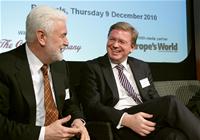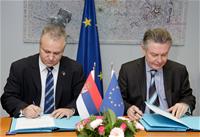Serbia – a step forward towards Europe
Dessislava Dimitrova, January 18, 2011
 Serbian government announced on Thursday (January 13) that the country had completed the questionnaire, which it received from the European Commission in the end of November and which it planned to send back to Brussels on January 31. The questionnaire is the basis, on which a country is being assessed whether it met the political and economical criteria for membership and whether it is prepared to enter the next stage, when a timeframe could be set for the start of the negotiations on a candidate status.
Serbian government announced on Thursday (January 13) that the country had completed the questionnaire, which it received from the European Commission in the end of November and which it planned to send back to Brussels on January 31. The questionnaire is the basis, on which a country is being assessed whether it met the political and economical criteria for membership and whether it is prepared to enter the next stage, when a timeframe could be set for the start of the negotiations on a candidate status.
The questionnaire consists of 2,483 questions and subquestions, separated into six annexes and 33 chapters. Following its delivery the Commission will analyse the questions and, if necessary, send additional questions or a mission of experts, who will asses the country’ preparedness. According to Serbian media, the Commission is expected to start preparing its opinion in the beginning of the summer, which means that the country could receive a candidate status in December.
They remind that in order to prepare the answers to the questionnaire, the government established in 2007 a special administrative unit, comprised of 35 working groups in charge of the different chapters of the questionnaire and led by the European Integration Office. So far, Serbia has sent for translation around 7,000 pages, while another 1,000 are still not translated. The government will pay the translators, who were selected after a tender, between 11,000 and 12,000 euro.
Serbian President Boris Tadic told Serbian ambassadors during a meeting in Belgrade in the beginning of the month, that the country’s accession to the EU remained a main task in the field of foreign policy. According to Serbian Foreign Minister Vuk Jeremic, there were four major priorities for the country: EU integration, observation of the constitutional order, regional stability and deepening of economic ties worldwide.
In its progress report on Serbia, published in November, the Commission notes that the country has made progress towards meeting the political criteria, but additional efforts are needed to ensure the compatibility of some constitutional provisions with European standards, particularly in the judiciary and that further steps should be taken to improve the functioning of Parliament through the adoption of a new Law on the National Assembly and new rules of procedure. Serbia is also expected to strengthen reforms in the area of public administration. An acceptable and sustainable solution for the participation of both Serbia and Kosovo in regional fora needs to be agreed as soon as possible, according to the report.
As regards the economic criteria, further progress towards establishing a functioning market economy has been limited. Serbia needs to make more efforts in restructuring its economy so as to cope in the medium term with the competitive pressures and market forces within the European Union. Growing unemployment, back-paddled privatisation of socially-owned companies and delayed privatisation of the state-owned companies, red tape deficiencies in competition and
infrastructure, as well as the informal sector are seen as major problems that Serbia needs to tackle in economic aspect. Last week the country made a step  forward in this direction by signing a bilateral agreement with the EU on Serbia's accession to the World Trade Organisation.
forward in this direction by signing a bilateral agreement with the EU on Serbia's accession to the World Trade Organisation.
The report hails Serbia’s efforts to fight money laundering by adopting an action plan and establishing a coordination body. It also says that good progress has been made in fighting organised crime, but notes that a new and substantially revised Criminal Procedure Code has still not been adopted.
Together with the progress reports on EU enlargement, the Commission also proposed a Candidate Status for Montenegro, recommending that accession negotiations with Montenegro and Albania should be opened once these countries had met a number of key priorities set out in the opinions. The Commission confirmed that Croatia was entering the final phase of its accession preparations, while the negotiations with Turkey advance, albeit at a slow pace.
Accession negotiations with Iceland have been launched and Serbia's EU membership application is being processed. The Commission has presented its Opinions on Albania's and Montenegro's membership applications. The Commission renewed its 2009 recommendation that accession negotiations with the former Yugoslav Republic of Macedonia should be opened.
 Bakir Izetbegovic, Andrej Plenkovic | © Council of the EU
Bakir Izetbegovic, Andrej Plenkovic | © Council of the EU Aleksandar Vucic, Recep Tayyip Erdogan | © Serbian Presidency
Aleksandar Vucic, Recep Tayyip Erdogan | © Serbian Presidency Jean-Claude Juncker, Zoran Zaev | © European Commission
Jean-Claude Juncker, Zoran Zaev | © European Commission